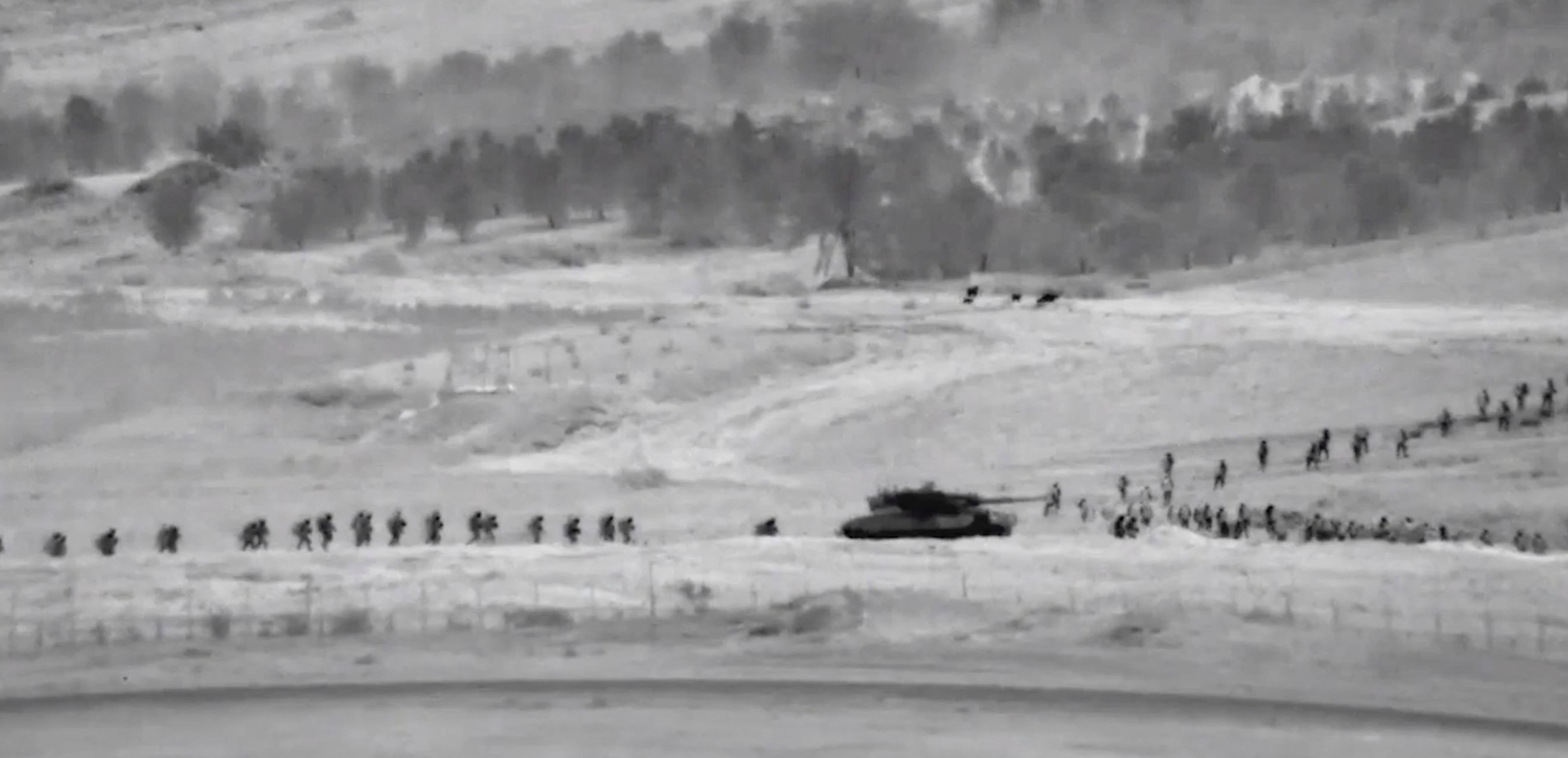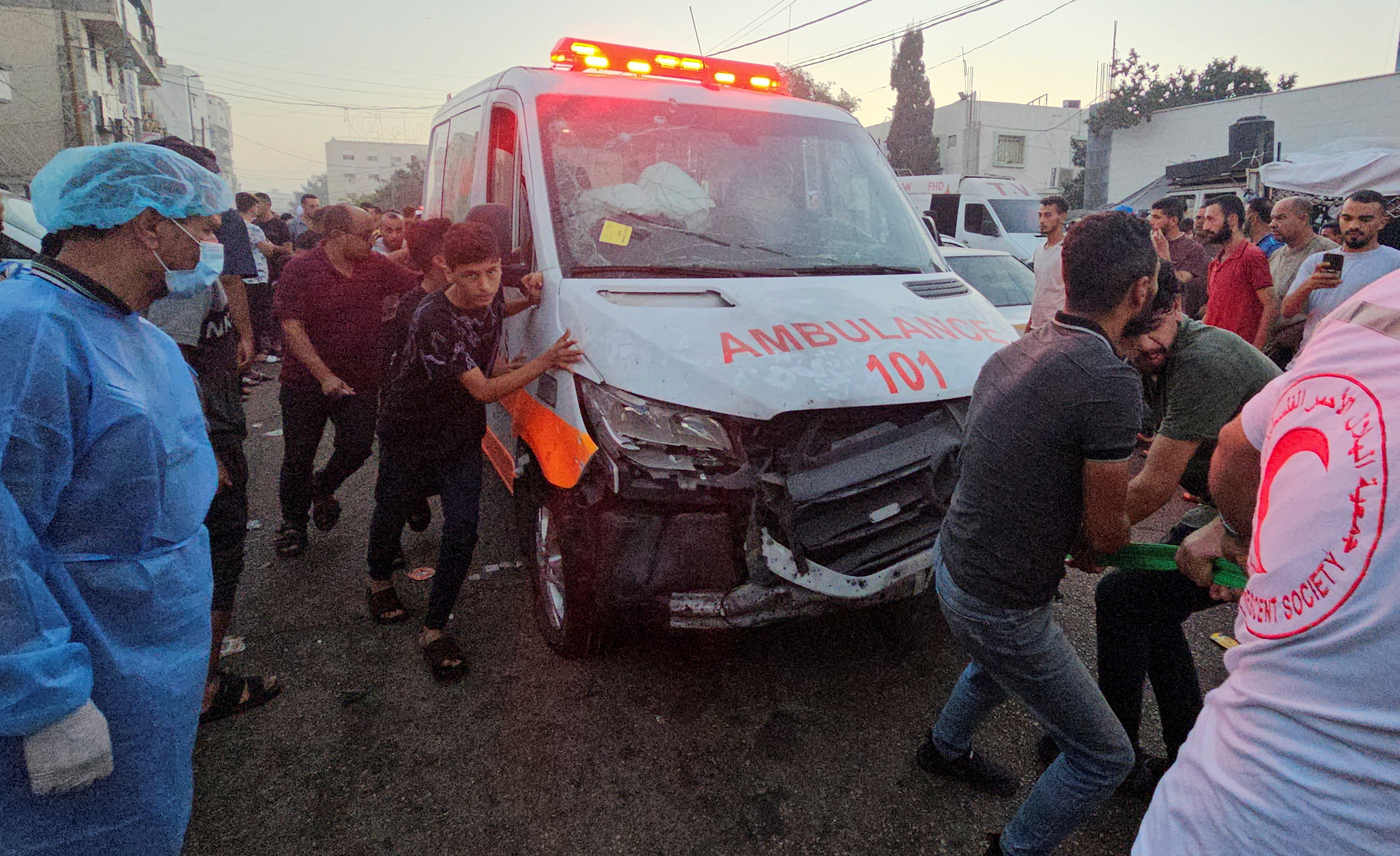
Israel rejects ceasefire calls, Lebanon strike angers Hezbollah
PHOTO CAPTION: A view of a military vehicle and soldiers walking at a location given as Gaza, amid the conflict between Israel and the Palestinian Islamist group Hamas, in this screengrab obtained from a handout video released on November 5, 2023. Israel Defense Forces/Handout via REUTERS
By Nidal al-Mughrabi, Ali Sawafta and Simon Lewis
GAZA/RAMALLAH (Reuters) - Israel on Sunday rebuffed growing international pressure for a ceasefire and said its forces had encircled Gaza City as the top U.S. diplomat scrambled to contain a crisis that threatened to cause further escalation in neighbouring Lebanon.
Gaza was under "unprecedented bombardment" from Israel on Sunday, Palestinian news agency WAFA reported, while Palestinian telecommunications company Paltel said that all communications and internet services had once again been cut.
Palestinian Authority President Mahmoud Abbas joined international calls for an immediate ceasefire at a meeting with U.S Secretary of State Antony Blinken, who was making an unannounced visit to the occupied West Bank.
But after Blinken repeated U.S. concerns that a ceasefire could aid Hamas, Israeli Prime Minister Benjamin Netanyahu ruled that out unless hostages held by Hamas were released: "There will be no ceasefire without the return of the hostages. This should be completely removed from the lexicon."
Blinken arrived in Ankara late on Sunday for further talks on the Gaza conflict with Turkish Foreign Minister Hakan Fidan on Monday. Hours earlier, police in southern Turkey used tear gas and water cannon as hundreds of people at a pro-Palestinian rally tried to storm an air base that houses U.S. troops.
GAZA CITY SURROUNDED
A military spokesperson said Israeli forces had surrounded the main city in Gaza: "They reached the coast in the southern part of Gaza City and they encircled Gaza City."
Tensions increased with Lebanon as an Israeli strike on a car in the south of the country killed three children and their grandmother, Lebanese authorities said.
Israel's chief military spokesperson said the military had attacked "terrorist targets of Hezbollah in southern Lebanon" in response to a missile attack against tanks that killed an Israeli citizen. He said a Hezbollah drone was also shot down.
Hezbollah said it responded by firing rockets at the town of Kiryat Shmona in northern Israel. The group said it would never tolerate attacks on civilians and its response would be "firm and strong".
Sirens sounded across central Israel, with Israeli media reporting rockets struck areas in and around Tel Aviv. No casualties were reported.
Health officials in Hamas-controlled Gaza said more than 9,770 Palestinians have been killed in the war, which began when Hamas launched a surprise attack on southern Israel on Oct. 7, killing 1,400 people and taking more than 240 hostage.
Israel said 31 of its soldiers have been killed so far.
'TORN-APART FLESH'
At the Maghazi refugee camp in Gaza, where the health ministry in the Hamas-run enclave said Israeli forces had killed at least 47 people in an overnight strike, people searched for victims or survivors.
"All night I and the other men were trying to pick the dead from the rubble. We got children, dismembered, torn-apart flesh," said Saeed al-Nejma, 53, adding that he had been asleep with his family when the blast hit his neighbourhood.
Asked for comment, the Israel Defense Forces (IDF) said they were gathering details.
In a separate attack, 21 Palestinians from one family, including women and children, were killed in strikes overnight, the health ministry said. The IDF declined to comment.
Reuters could not independently verify these accounts.
"We demand that you stop them from committing these crimes immediately," Abbas told Blinken, urging an "immediate ceasefire" from Israel.
Palestinians were facing a war of "genocide and destruction", news agency WAFA quoted Abbas as saying.
CEASEFIRE CALLS
Foreign ministers from Qatar, Saudi, Egypt, Jordan and the United Arab Emirates met Blinken in Amman on Saturday and also urged him to persuade Israel to agree to a ceasefire. Blinken also visited Iraq on Sunday and held talks with Prime Minister Mohammed al-Sudani.
Pope Francis joined calls for peace. "Stop in the name of God," he said, calling for humanitarian aid and help for the injured to ease the "very grave" situation in Gaza.
But Blinken says a ceasefire would benefit Hamas, allowing it to regroup and attack again. Instead, the U.S. wants localised pauses in fighting to allow in humanitarian aid and for people to leave Gaza.
"The Secretary reaffirmed the United States' commitment to the delivery of life-saving humanitarian assistance and resumption of essential services in Gaza," spokesperson Matthew Miller said.
Blinken said the Palestinian Authority should play a central role in the future of the Gaza Strip, a U.S. official said after the West Bank visit.
EVACUATIONS HALTED
Efforts were under way on Sunday to resume evacuations of foreign nationals and injured Gazans through the Rafah crossing to Egypt, suspended since Saturday after a deadly attack on an ambulance, Egyptian, U.S. and Qatari officials said.
The Rafah crossing to Egypt's Sinai Peninsula is the only exit point from Gaza not controlled by Israel. Aid trucks were still able to travel into Gaza, two Egyptian sources said.
Evacuations began on Wednesday under an internationally brokered deal. More than 300 Americans have left Gaza, but some remain, Jonathan Finer, deputy national security adviser, said.
Qatar's foreign ministry said that without a "period of calm" in Gaza, its mediators would not be able to secure the release of Israeli hostages held in the enclave.
The Gulf state has, in coordination with the U.S., led talks with Hamas and Israeli officials over the release of hostages.
Worsening violence in the Israeli-occupied West Bank has fuelled concerns it could become a third front in a wider war, in addition to Israel's northern border with Lebanon.
Israeli military spokesperson Rear Admiral Daniel Hagari said the IDF were focussing on ground operations in the north of Gaza "to free our hostages and to free Gaza from Hamas".
"We will adapt our plan to stay with the goals, and it will take us a long time," he added.
He said the IDF has exposed a network of Hamas tunnels, command centres and rocket launchers beneath and adjacent to hospitals in northern Gaza.
"Hamas systematically exploits hospitals as part of its war machine," Hagari told reporters.
In a statement, Hamas called on the United Nations secretary general to form an international committee to visit hospitals to counter Israel's "false claims" that Hamas uses them to launch attacks.
'HORRIFIC NIGHTMARE'
The U.N. humanitarian office estimates that nearly 1.5 million of Gaza's 2.3 million people are internally displaced.
Aid currently entering Gaza is "nowhere near" enough to meet people's needs, World Food Programme head Cindy McCain said after visiting the Rafah crossing.
"People are living in a horrific nightmare," McCain said. "Food and water are running out. A steady flow of aid is needed to meet the desperate needs now."
(Reporting by Nidal al-Mughrabi in Gaza, Ali Sawafta and Simon Lewis in Ramallah, Dan Williams in Jerusalem, Yusri Mohamed in Ismailia, Ahmed Mohamed Hassan in Cairo; Additional reporting by Clauda Tanos; Writing by Michael Perry, Ingrid Melander and Giles Elgood; Editing by William Mallard, Alexander Smith, Conor Humphries, Hugh Lawson and Lisa Shumaker)









